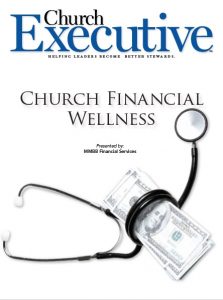
![]()
By Rev. James R. Cook, CFP®
If you think Medicare will cover all your healthcare costs when you retire, think again.
The sobering reality is that Medicare generally only covers about 60 percent of the cost of basic healthcare services for individuals aged 65 and older. The remaining 40 percent must be covered by the individual.
The Employee Benefits Research Institute (EBRI) recently estimated that some Medicare beneficiaries (couples) could need as much as $400,000 in savings to cover program premiums, deductibles and certain other health expenses in retirement. The EBRI analysis presents several scenarios:
- In 2018, a 65-year-old man needed $75,000 in savings and a 65-year-old woman needed $99,000 in savings for a 50-percent chance of having enough to cover premiums and median prescription drug expenses in retirement. For a 90-percent chance of having enough savings, the man needed $148,000 and the woman needed $161,000.
- For a 50-percent chance of having enough to cover healthcare expenses in retirement, a couple with median prescription drug expenses needed $174,000 in savings. For a 90-percent chance of having enough, the couple needed $296,000 in savings.
Those figures are daunting, considering that most retirees don’t have savings set aside specifically to pay for healthcare expenses in retirement. Typically, retirees pay for their healthcare using current income such as Social Security, pensions, earned income and retirement account distributions. But health insurance premiums and out-of-pocket healthcare expenses account for an estimated 15 percent of healthcare spending in retirement — and that does not include long-term care.
 Being proactive really pays off
Being proactive really pays off
There are steps you can take now to become educated and financially prepared for healthcare expenses in retirement. Long before you retire, spend time learning as much as you can about Medicare, a federal health insurance program that covers most people once they turn 65 and provides benefits for others under 65 who receive Social Security benefits (such as those who are disabled). Original Medicare is a fee-for-service insurance program, so you can see any doctor that accepts Medicare, and Medicare will pay its portion of covered services.
The Original Medicare program consists of two parts:
Part A is hospital insurance. This covers inpatient hospital care, required care in a skilled nursing facility, some home care, hospice care and inpatient psychiatric care. There are limits on the length of time Medicare will pay for covered care, and deductibles apply to most services. Note that Medicare does not pay for long-term care. Most people do not pay a premium for Medicare Part A.
Part B is medical insurance. This covers medically necessary doctors’ services, well-care visits, home health services, durable medical equipment and other medical services. You pay a monthly premium for part B and there is also an annual deductible and coinsurance of 20 percent on most covered services.
What isn’t covered?
Medicare does not cover dental care, eye exams, glasses or other types of corrective lenses, dentures, hearing aids and most types of alternative medicine. Original Medicare also does not cover prescription drugs.
Medicare Part D: Prescription Drug Plans
If you are enrolled in Medicare, you may elect to enroll in a Part D prescription drug plan. Part D plans are offered by private insurance companies, approved by Medicare. Plans vary by cost and the specific drugs that they cover (known as their formulary). When shopping for a Part D plan, it is important to make sure that the plan covers any prescription medications that you are currently taking.

Medicare Supplements: Medigap Plans
If you are enrolled in Original Medicare, you might want to consider enrolling in a Medigap Plan to cover some of the medical costs that Medicare does not, such as copayments, deductibles and coinsurance. Medigap plans, approved and regulated by Medicare, are offered by private insurance companies and can help you manage your out-of-pocket health costs. During the initial enrollment period for Medicare, you cannot be denied coverage for a Medigap plan and there is no underwriting. If you fail to enroll during your initial enrollment period, you might face underwriting that could lead to denial of coverage, or significantly increased premium rates.
Medicare Part C: Medicare Advantage
An alternative to original Medicare is Medicare Advantage Plans. These plans, provided by private companies, cover the services of original Medicare Parts A and B, but are administered directly by an insurance company not through Medicare. They function similarly to what you may have in insurance during your working years. Plans usually have a specific network of providers, often referred to as a PPO network, and some operate as HMOs. Advantage Plans limit you to their network and might require referrals to see certain specialists or receive specific services. These plans can also be regional in nature, so you will need to make sure that the network covers you in all the places you plan to spend considerable time.
Medicare Advantage Plans include the cost of the Part B premium in what you pay, and might add an additional premium as well, but with Advantage Plans you do not need a Medigap Plan because the fee structure wraps in the benefits of a Medigap plan.
Once you have become familiar with Medicare, you should estimate your out-of-pocket costs such as insurance co-pays and Medicare premiums to forecast what potential healthcare costs could look like, including long-term care. You need to understand how paying for future healthcare expenses fits into your overall retirement income strategy.
Above all, you should meet with a Cerftified Financial Planner™ professional to review your retirement income needs. Your financial planner will also help you navigate the choices of healthcare in retirement and make sure that your choices are integrated into your financial plan.
Rev. James R. Cook, CFP®, is a financial planning specialist. He brings expertise in comprehensive financial and retirement planning to his work at MMBB. Cook holds a B.S. in Psychology from Lewis & Clark College, a Master of Divinity degree from Fuller Theological Seminary, and an MBA from the University of Missouri Kansas City.


